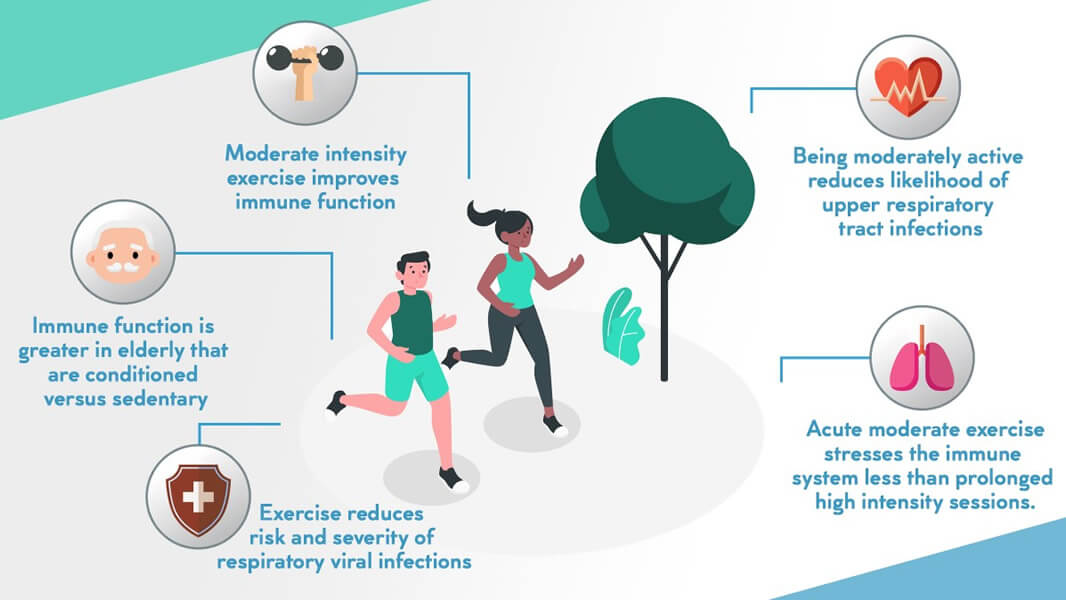Exercise and immunity.

We all know the drill: wash your hands, avoid touching your face and eyes, stay at home and stay at least 6 feet apart when in public to maintain physical separation. These along with other guidelines are in place for our own safety in an effort to stop the spread of the coronavirus. But wait!! What about one of our best defenses against illness? Exercise!! Regular moderate to vigorous activities like walking, jogging, and dancing adding up to 150 minutes weekly play a critical role in supporting your immune system and protecting your body against illness caused by bacteria and viruses. In fact, staying fit (or getting fit) during this pandemic may be your ticket to staying healthy at this critical time and even after the acute threat passes.
Your immune system is a complex collection of defensive mechanisms your body has in place for rapid response at a moment’s notice that halt invading pathogens – including viruses. Think of your immune system like a military operation with various layers of protection: reconnaissance units, specialized forces on constant patrol and other units that specifically attack known enemies. The immune system’s “soldiers” come more in the form of various immune cells and compounds that can act immediately or build up protection over time. Killer T-cells and lymphocytes along with cytokines are just a few of the specialized immune cells and compounds in the body’s immunity army.
To make matters worse, research shows that the body’s ability to mobilize an effective strike on invading pathogens is actually impaired when we are experiencing stress created by the pandemic’s current isolation orders. Cortisol levels (the stress hormone) are elevated during periods of isolation and confinement, along with feelings of uncertainty and heightened anxiety, all of which in turn impairs the body’s ability to fight off infections. Sounds like a catch-22 – right? We are isolating to stop the virus from spreading but this in fact impacts our stress levels which indirectly impairs our ability to stay healthy. Yikes!!
But let’s not lose hope here because staying or getting physically active has a profound impact on your immune forces and potentially may help you stay healthy as well as assist in easing feels of stress and anxiety and boost feelings of well-being and mood.
Here’s how:
- A single session of exercise, moderate to vigorous effort such as a very brisk walk or jog, stimulates literally an instantaneous mobilization of billions of immune cells from spleen and bone marrow into the blood and then various tissue sites including the lungs. These immune cells, such as white blood cells, are primed to fight and can attack cells that have been infected by a virus.
- A single session of exercise also prompts immune cells’ recirculation between the blood and tissues acting as enhanced surveillance for pathogens and ability to thwart an infection.
- A session of exercise also enhances specialized body proteins called cytokines such as interleukin-6 (IL-6) which helps direct immune cells to the site of the infection. The elevation of IL-6 and other cytokines can help calm inflammation. Great news as inflammation is the hallmark of many viral infections.
When performed consistently, routine aerobic exercise adds up to an enhanced immune capacity and may effectively reduce a person’s susceptibility to, and speed of recovery from illness.
- Studies show that people who participate in moderate daily exercise have approximately 50% lower risk of contracting an upper respiratory tract infection.
- Research shows regular physical activity is associated with lower death rates from infection with influenza and pneumonia. While it’s much too early to know whether routine exercise protects against the coronavirus, researchers suspect physically fit individuals may have a lower mortality rate from COVID-19.
- Exercise, particularly aerobic such as indoor cycling and jogging, also improves lung function, which in turn may assist with improved airflow in the advent of an upper respiratory tract infection or another related upper airway illness.
- Routine exercise also has been shown to improve feelings of well-being and enhance mood while calming anxiety and stress. Routine exercise appears to impact specific neurotransmitters and other neurologically “feel good” compounds in the brain.
Start your defensive plan today!
I know what you’re thinking, “how can I start or even keep up a fitness plan with clubs closed and access to other forms of traditional exercise is extremely limited??!!” or “I’m home with kids so exercising is out of the question!” Desperate times requires creative measures! Finding new ways to stay or get fit is doable, surprisingly accessible and even fun for the entire family.
Exercise goal is 150 minutes or more a week (5 days at 30+ minutes or you can add up 5 or 10 minutes here or there of vigorous activity) of moderate activity such as dancing to music with the kids at home to reach your 30+ minute daily goal rather than doing 30+ minutes at once.
- Follow along with exercise classes online or on TV – there is a wide array from yoga to high Intensity workouts as well as video workout for kids and whole families.
- NeoLife’s Kenya Instagram Account offers some examples of exercise routines that you can do at home.
- Structure activity with your “isolation unit” (family or few friends) such as a morning walk or afternoon bike ride (while observing community guidelines for distancing and face masks).
- Set up an outdoor fitness course on your sidewalk, front lawn or elsewhere with stations that you run/walk to and perform different calisthenics.
- Dust off that home cardio equipment such as a treadmill or stationary bike and use it (listen to podcasts or watch TV to pass the time).
Find more info about staying active during this pandemic here.

